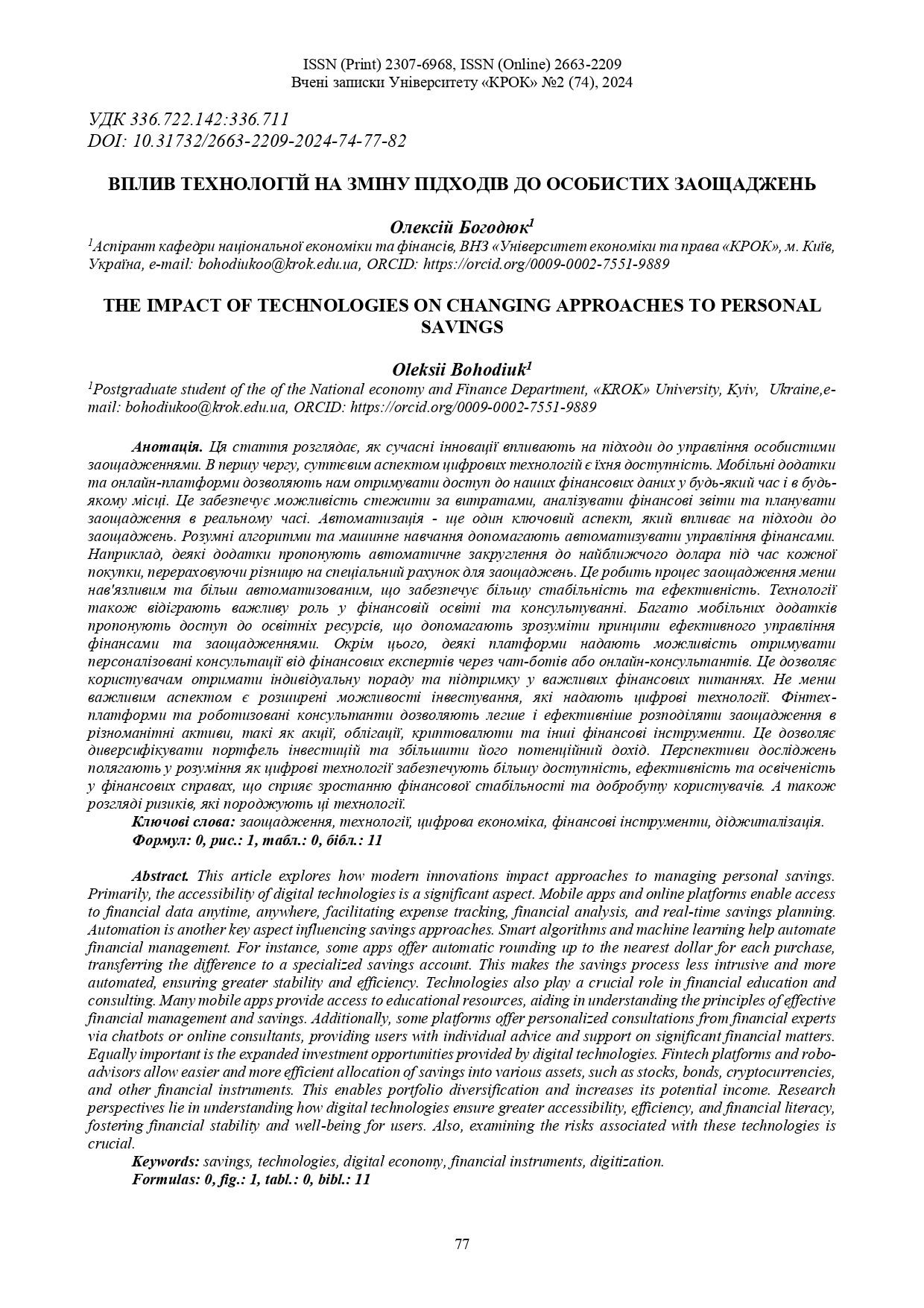THE IMPACT OF TECHNOLOGIES ON CHANGING APPROACHES TO PERSONAL SAVINGS
DOI:
https://doi.org/10.31732/2663-2209-2024-74-77-82Keywords:
savings, technologies, digital economy, financial instruments, digitizationAbstract
This article explores how modern innovations impact approaches to managing personal savings. Primarily, the accessibility of digital technologies is a significant aspect. Mobile apps and online platforms enable access to financial data anytime, anywhere, facilitating expense tracking, financial analysis, and real-time savings planning. Automation is another key aspect influencing savings approaches. Smart algorithms and machine learning help automate financial management. For instance, some apps offer automatic rounding up to the nearest dollar for each purchase, transferring the difference to a specialized savings account. This makes the savings process less intrusive and more automated, ensuring greater stability and efficiency. Technologies also play a crucial role in financial education and consulting. Many mobile apps provide access to educational resources, aiding in understanding the principles of effective financial management and savings. Additionally, some platforms offer personalized consultations from financial experts via chatbots or online consultants, providing users with individual advice and support on significant financial matters. Equally important is the expanded investment opportunities provided by digital technologies. Fintech platforms and robo-advisors allow easier and more efficient allocation of savings into various assets, such as stocks, bonds, cryptocurrencies, and other financial instruments. This enables portfolio diversification and increases its potential income. Research perspectives lie in understanding how digital technologies ensure greater accessibility, efficiency, and financial literacy, fostering financial stability and well-being for users. Also, examining the risks associated with these technologies is crucial.
Downloads
References
Brown, S., & Taylor, K. (2019). The Impact of Digital Technology on Personal Savings. Journal of Financial Technology, 5(2), 87-102.
Chen, L., & Zhang, Y. (2020). Mobile Applications for Financial Management: A Review of Current Trends and Future Directions. International Journal of Mobile Finance, 12(3), 321-335.
Garcia, R., & Martinez, E. (2018). The Impact of Fintech Platforms on Personal Savings Behavior: Evidence from a Survey Study. Journal of Financial Technology, 4(1), 30-45.
Jones, M., & Williams, T. (2019). Financial Education in the Digital Age: Strategies for Enhancing Financial Literacy. Journal of Consumer Finance, 16(2), 145-160.
Kim, D., & Park, C. (2020). Trends and Challenges in Personal Financial Management: A Cross-Country Comparative Analysis. International Journal of Finance and Economics, 25(4), 410-425.
Lee, H., & Kim, S. (2020). Emerging Trends in Personal Finance: Blockchain Technology and Cryptocurrencies. Journal of Financial Engineering, 8(3), 201-215.
Patel, N., & Gupta, S. (2021). The Role of Artificial Intelligence in Personal Savings: A Case Study of Robo-Advisors. AI in Finance Quarterly, 3(4), 210-225.
Smith, J., & Johnson, R. (2018). Automation in Personal Finance: Opportunities and Challenges. Journal of Financial Innovation, 7(1), 45-60.
Taylor, A., & Rogers, B. (2019). Personal Savings and the Sharing Economy: Implications for Financial Planning. Journal of Financial Planning, 32(2), 75-90.
Wang, Q., & Liu, J. (2021). Behavioral Economics Perspectives on Digital Financial Tools: Insights for Personal Savings. Journal of Behavioral Finance, 9(4), 315-330.
% of smartphone users have used an app to manage their finances in the past month - https://www.thinkwithgoogle.com/marketing-strategies/app-and-mobile/finance-app-usage-statistics-by-month/

Downloads
Published
How to Cite
Issue
Section
License

This work is licensed under a Creative Commons Attribution-NonCommercial 4.0 International License.

